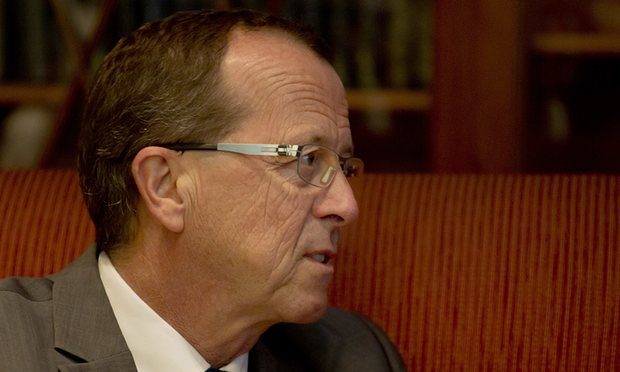Kobler calls for west’s help to fight ISIS in Libya, ahead of Germany’s summit

The United Nations envoy to Libya, Martin Kobler, has called for western forces to help combat Islamic State in partnership with the country’s new government.
With Barack Obama due to meet four European leaders in Germany on Monday for a summit that is likely to focus on Libya, Kobler said foreign powers should offer training and military support, combined with an end to the UN arms embargo.
“The Daesh [Isis] expansion can only be stopped militarily,” he said. “There is a consensus that a united Libyan army needs training; the lifting of the weapons embargo is very important. We need the most modern weapons to finish Daesh.”
Isis has been stepping up its offensive against Libya’s oilfields. An assessment circulating in foreign missions reports that in the last two weeks the group has broken out of its base in the coastal town of Sirte in three thrusts.
The Obama summit with European leaders has a wide agenda, but the presence of the Italian prime minister, Mario Renzi, suggests a chief focus will be on Libya, including the need to defeat Isis and stem the migration crisis. The west is pressing the new Libyan government to seek permission for the EU’s Operation Sophia to operate inside Libyan waters, increasing the effectiveness of the EU’s efforts to defeat people traffickers.
Obama has described Libya as his biggest foreign policy mistake, and there is now no quick way to persuade the many Libyan factions to unite behind a stable UN-backed government of national accord.
Three weeks after arriving in the capital, the GNA’s prime minister, Fayez al-Sarraj, is shunned by both an Islamist-led Tripoli government and the elected parliament in Tobruk. The need to garner sufficient political support has led the Sarraj to hold off from formally requesting western help, including allowing the west to operate in Libyan sovereign waters. His opponents are already accusing him of being a tool of the west.
Kobler, a German diplomat, said a military partnership with Sarraj, rather than unilateral intervention, would remove legal obstacles to foreign forces deploying in the country. “Why shouldn’t an established government request foreign military assistance?” he said. “If you have the consent of the [Libyan] government then you have no intervention.”
An Isis eastern offensive has hit oilfields at Fida, Maradah and Zillah in the Sirte Basin, centre of Libya’s oil industry, and militants have clashed with local forces around the central towns of Beni Walid and Sabha.
Meanwhile, Isis has deployed near the south-western town of Awbari, threatening the main western oilfields at Sharara and El Feel. It has been estimated that Libya lost $70bn in revenue due to the closure of oilfields from August 2013 to December 2015.
The Pentagon estimates Isis has 6,000 fighters, mostly foreign, in Libya – far fewer than in Iraq and Syria. But western officials say the terrorist group has adapted its tactics, sending flying columns through the Sahara to launch pinpoint attacks in aan attempt to cripple the oil industry.
[su_note note_color=”#fefccb”]The views expressed in this article are the author’s own and do not necessarily reflect Libyan News’s editorial policy.[/su_note]
How to submit an Op-Ed: Libyan Express accepts opinion articles on a wide range of topics. Submissions may be sent to oped@libyanexpress.com. Please include ‘Op-Ed’ in the subject line.
- Aguila, Turkish Envoy Discuss Cooperation - January 14, 2025
- Sahara Bank Officials Jailed in 53m Dinar Credit Fraud - January 14, 2025
- Oil platform runs aground off northern Tunisian coast - January 14, 2025


